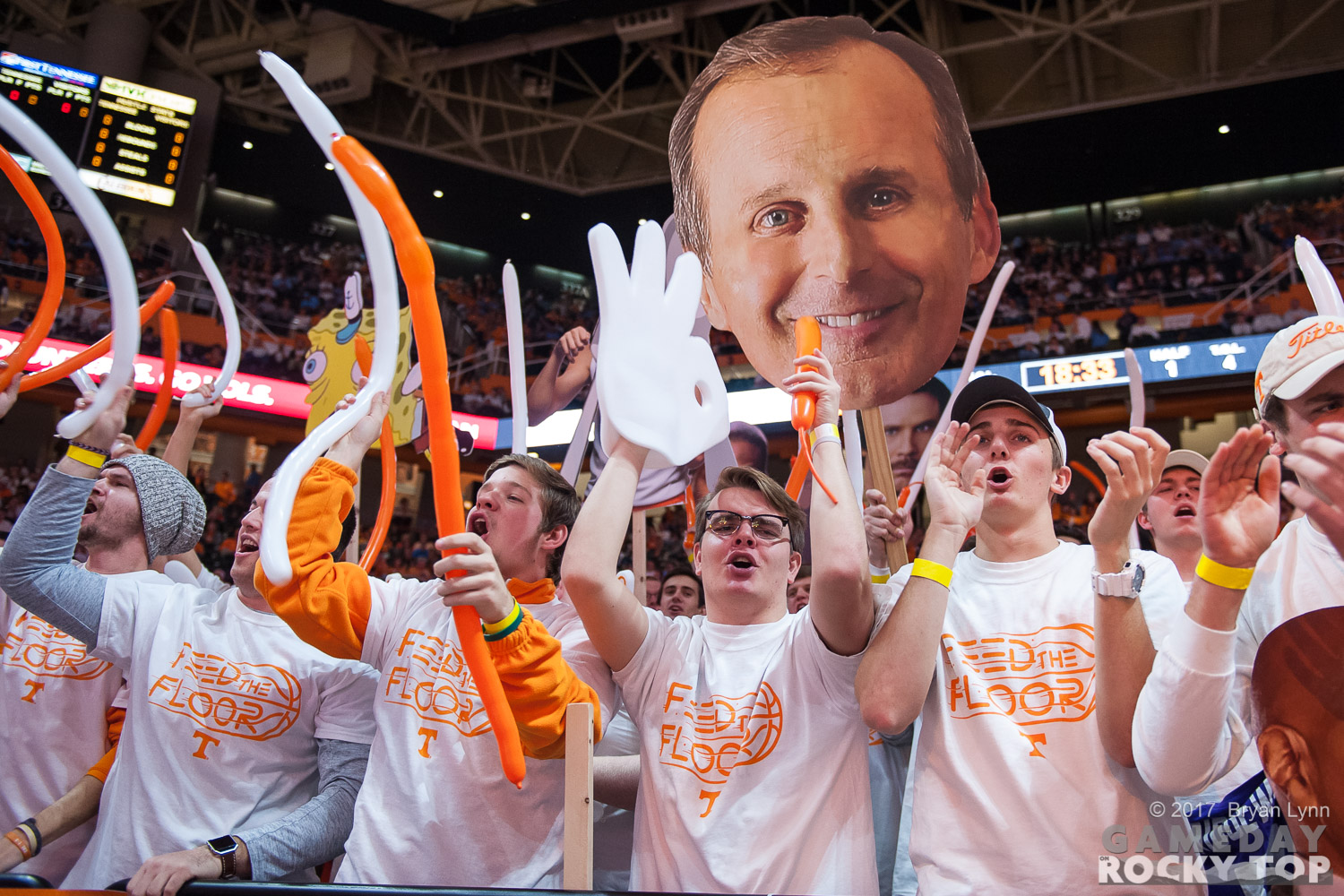The turnovers in the last few minutes are frustrating, but Tennessee’s biggest cause for concern is defending great guards. Villanova’s Mikal Bridges and Jalen Brunson combined for 46 points on 15-of-26 from the field. And Arkansas got 61 from Jaylen Barford and Daryl Macon on 20-of-36.
Tennessee countered with outstanding play from its own guards on the offensive end in Fayetteville: 21 from Jordan Bone and 17 from James Daniel. The Vols will need more of the same in the future if they fail to improve on the other end. Foul trouble was a significant factor at Arkansas, and it stands out in amazing ways in the play-by-play. With multiple players on the foul hampered with four fouls, the Vols had to defend differently.
Admiral Schofield hit a three to put the Vols up 68-60 with 4:04 to play, then picked up his fourth foul ten seconds later at the under four timeout. Arkansas scored 60 points in the game’s first 36 minutes (1.67 per minute). They scored 35 points in the game’s final nine minutes (3.88 per minute, a 156-point pace for a full game). In the last four minutes of regulation and all of overtime, the only Arkansas possessions that did not end with points were the final sequence in regulation, and two missed free throws by Daniel Gafford with 40 seconds to play in overtime.
Grant Ramey points out the Vols are 16th nationally in fouls per game. Obviously, that has to come down. We saw how quickly Tennessee’s defense – still ninth in KenPom’s ratings – can fall apart against a good offense when multiple components are slowed or sidelined with foul trouble. But even when fouls are less of an issue, Tennessee’s backcourt defense looks like its biggest weakness entering the new year.
The good news: the Vols still had a chance to win. And they’ll get another shot at a good backcourt right away.
Auburn’s moment arrives
The Tigers haven’t been to the NCAA Tournament since 2003 and the NIT since 2009. Last year Bruce Pearl got them above .500 for the first time since that 08-09 season. This year they’re off to a 12-1 start, and are a 10 seed in the January 1 Bracket Matrix.
In classic Pearl scheduling, the Tigers faced a bunch of RPI-friendly mid-majors. They lost to Temple on a neutral floor, but have wins over Winthrop, Dayton, UAB, Middle Tennessee, and Murray State. In their marquee test, they hosted UConn in a down year for the Huskies (126th in KenPom), and won by 25.
That means their two most difficult games so far will come this week: at #23 Tennessee on Tuesday, then hosting #22 Arkansas on Saturday.
Auburn is a lot like us. With 6’11” Austin Wiley and 6’7″ Danjel Purifoy – two of their top four scorers last year – out indefinitely due to potential ineligibility surrounding the ongoing federal investigation, the Tigers play no one bigger than 6’8″. Nine players get 13+ minutes; the Vols have nine getting 11+.
Auburn hopes to be good, but is yet to play a great team. Tennessee hopes to be great, and has played several already.
What Auburn does well:
- Defending inside the arc. Opponents shoot just 41.7% against the Tigers from two, the 11th best defensive percentage in the nation. This is in part because, like Tennessee, Auburn is an excellent shot-blocking team despite their lack of size. The main threat here is 6’8″ sophomore Anfernee McLemore, who tosses 3.4 shots per game in just over 20 minutes of action. Auburn blocks 19.2% of opponent shots, fourth nationally, and McLemore leads the nation in this stat in sending back 18.7% of the shots taken while he’s on the floor.
- Offensive rebounding. Auburn is 14th nationally in offensive rebounding percentage (37.2%). 6’3″ Desean Murray, a Presbyterian transfer, has been particularly good here with 36 offensive rebounds on the year.
- Free throw shooting. Hold your 2007 Ohio State jokes. The Tigers’ 77.1% is 20th nationally; Auburn’s top four scorers all shoot between 79-82%. You do not want to be behind this bunch in the final minute.
What Tennessee can do to win:
- Defend the three. Auburn launches 26 threes per game, 8.5 of them from Bryce Brown (hitting 35.5%). This won’t be anything new for Tennessee: Vol opponents have taken 237 threes, the 13th most any team has seen this season. The Vols give up just 34.2% on the year from three, and volume shooting teams like Furman (25.9%) and even Villanova (35.3%) have struggled to find victory that way against Tennessee. If Auburn wins from the arc, they will be the first to do so against Tennessee this year.
- Continue to share the ball. The Vols have dropped from first to eighth nationally in assist percentage, but still share the ball on 65.5% of their made baskets. Auburn doesn’t create a ton of turnovers, and won’t be the first fast-paced team the Vols have seen this year. Good offense via good shots is still Tennessee’s best plan of attack.
- Make free throws. While the Tigers shoot their own free throws well, they’ve certainly been helped by the opposition shooting just 73.8% against them. After a solid start to the season, Tennessee is just 44-of-66 (66.7%) in the last three games. Eight missed free throws at Arkansas made a difference. Tennessee needs this to trend back in the other direction.
The Vols are 4-1 against Bruce Pearl at Auburn, but this is the first one where the ex-Tennessee coach isn’t the lead story. That’s a credit to both Pearl and Rick Barnes for getting these two teams where they are now from where they were when both took over. The Vols need a rebound after a tough loss to open SEC play. Auburn needs a win to validate their place on the bubble. It should be another good one.
7:00 PM ET Tuesday, ESPNU. Go Vols.

